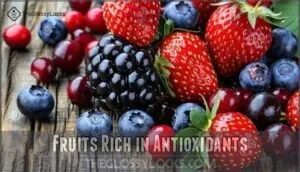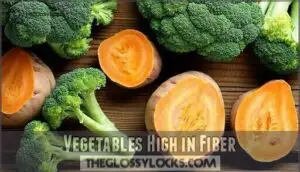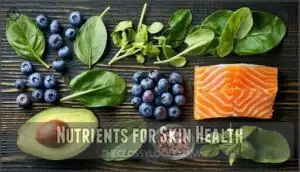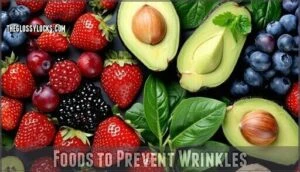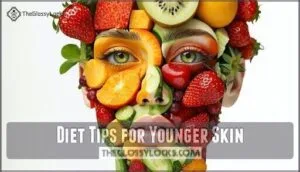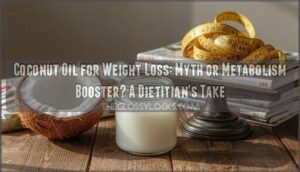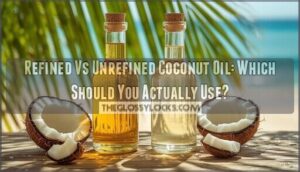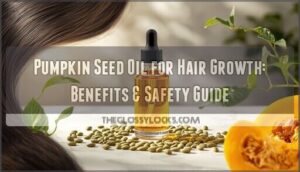This site is supported by our readers. We may earn a commission, at no cost to you, if you purchase through links.
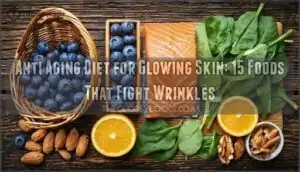
You’ll want to load up on antioxidant-rich berries, which fight free radicals that cause wrinkles, and omega-3 packed salmon that keeps skin supple.
Think of vitamin C from citrus fruits as your collagen’s best friend, while sweet potatoes deliver beta-carotene for natural radiance.
Don’t forget leafy greens like spinach, which provide the building blocks for healthy cell turnover, and nuts and seeds that offer healthy fats that maintain your skin’s moisture barrier.
The real magic happens when you combine these foods strategically throughout your week.
Table Of Contents
- Key Takeaways
- Foods for Glowing Skin
- Anti-Aging Diet Benefits
- Nutrients for Skin Health
- Foods to Prevent Wrinkles
- Diet Tips for Younger Skin
- Frequently Asked Questions (FAQs)
- Which diet is the best for anti-aging?
- Which food is best for anti-aging skin?
- Which diet is best for glowing skin?
- Which diet makes you look younger?
- How long before seeing skin improvements?
- Can supplements replace anti-aging foods entirely?
- Which foods worsen skin aging process?
- Do cooking methods affect anti-aging nutrients?
- Are organic foods better for skin?
- Conclusion
Key Takeaways
- You’ll see visible skin improvements within 2-4 weeks by eating antioxidant-rich berries, omega-3 packed salmon, and vitamin C sources like citrus fruits that fight free radicals and boost collagen production naturally.
- Your skin’s moisture barrier strengthens when you consume healthy fats from nuts, seeds, and avocados, which maintain hydration and elasticity while supporting cellular repair from within.
- You can prevent wrinkles by loading up on beta-carotene from sweet potatoes and leafy greens like spinach, which provide the building blocks for healthy cell turnover and protect against UV damage.
- You’ll accelerate skin aging if you eat processed foods, refined sugars, and trans fats that trigger inflammation and break down collagen—stick to whole, nutrient-dense foods for maximum anti-aging benefits.
Foods for Glowing Skin
When you choose the right foods, you’re basically feeding your skin from the inside out with nutrients that support collagen production, fight oxidative stress, and maintain cellular repair.
Your skin reflects what you eat—nourish it with the right foods and watch it glow from within.
Research shows that incorporating antioxidant-rich fruits, fiber-packed vegetables, omega-3-containing fish, and healthy fats from nuts can substantially improve skin texture, reduce inflammation, and promote that coveted natural glow.
Fruits Rich in Antioxidants
In terms of antioxidant rich foods for glowing skin, fruits pack the most powerful punch against free radical damage.
These skin radiance superstars deliver polyphenol power and vitamin C sources that’ll transform your complexion from dull to dazzling.
Berries are especially beneficial due to their high antioxidant content.
- Blueberries – contain 9 millimoles of antioxidants per serving, offering maximum anthocyanin benefits
- Strawberries – provide ellagic acid for environmental protection
- Blackberries – deliver 6 millimoles of skin-protecting compounds
- Cranberries – support overall health while fighting aging
Vegetables High in Fiber
While antioxidant-rich fruits protect your skin from damage, high-fiber vegetables support your anti aging diet from within.
Broccoli delivers 5.2 grams of fiber per cup, promoting digestive health and gut microbiome balance. Sweet potatoes provide 6.3 grams while stabilizing blood sugar levels.
These glowing skin foods offer detox support and weight management benefits that reflect in your complexion.
Sweet potatoes are also a great source of beta-carotene for skin, which acts as an antioxidant.
Nuts and Seeds for Healthy Fats
Nuts and seeds pack a powerful punch for your skin’s health through their impressive fatty acid profile.
These nutritional powerhouses deliver healthy fats that boost skin elasticity while providing essential omega-3 fatty acids for deep hydration.
Here’s what makes them skin superstars:
- Nut antioxidants fight free radical damage
- Seed oil benefits include improved moisture retention
- Seed mineral content supports cellular repair
Your skin will thank you. Explore how nuts benefit skin through topical application.
Fish and Omega-3 Fatty Acids
Your skin’s best friends swim in cold waters.
Your complexion’s secret weapon lives in the produce aisle, waiting to transform dull skin into radiant gold.
Salmon benefits include omega-3 fatty acids that boost skin elasticity and hydration, while sardine nutrients pack EPA and DHA for cellular repair.
These omega-3 sources can’t be made by your body, so you’ll need dietary intake.
Healthy fats from fish reduce inflammation and maintain your skin’s protective barrier naturally.
Anti-Aging Diet Benefits
You’ll experience measurable improvements in skin texture, elasticity, and hydration when you consistently consume nutrient-dense foods that support cellular repair and collagen production.
An anti-aging diet provides your body with essential vitamins, antioxidants, and healthy fats that combat free radical damage while promoting the natural regeneration processes that keep your skin looking youthful and radiant, supporting cellular repair.
Importance Of Effective Communication
Your antiaging diet success depends heavily on how you communicate with others about your skin health journey.
Clear messaging about your youthful skin diet goals helps family understand your food choices.
Active listening when discussing anti aging foods with friends builds support networks.
Nonverbal cues from loved ones reveal their true feelings about your glowing skin transformation, making empathy building part of your wellness strategy.
Strategies For Conflict Resolution
When workplace tensions spike, your body produces cortisol that accelerates aging and dulls skin’s natural glow.
Effective mediation techniques and active listening reduce stress hormones, while compromise strategies prevent chronic inflammation.
Negotiation skills paired with emotional regulation keep cortisol levels stable, supporting your anti aging diet efforts.
Managing conflict protects your skin health diet from stress-induced damage that undermines radiant skin goals, which is crucial for maintaining a healthy and radiant skin.
Building Stronger Team Relationships
Beyond managing workplace conflicts, you can build stronger team relationships that mirror how the best foods skin loves work together.
Just like a radiant skin diet combines multiple nutrients, successful teams blend complementary strengths.
Here’s your team-building recipe:
- Trust and Respect – Foundation like foods for collagen
- Shared Goals – Unite like anti wrinkle foods targeting aging
- Open Communication – Flow like nutrients in skin health diet
- Conflict Management – Balance disagreements constructively
To further protect the skin, consider that UV rays cause aging.
Nutrients for Skin Health
Your skin’s health depends on specific nutrients that work together to maintain its structure, protect against damage, and promote cellular repair.
Understanding these key nutrients—vitamin C, vitamin E, beta-carotene, and healthy fats—helps you make informed choices about which foods can most effectively support your skin’s natural anti-aging processes.
Vitamin C for Collagen Production
Collagen-boosting powerhouse vitamin C transforms your skin from within by stimulating mRNA levels and enhancing collagen synthesis.
This essential nutrient maintains existing collagen networks while encouraging new growth, creating firmer, more elastic skin.
You can also find products with vitamin C collagen for targeted skincare.
| Vitamin C Source | Amount per Serving | Collagen Benefits |
|---|---|---|
| Red bell peppers | 190mg (1 cup) | Boosts type I & III collagen |
| Broccoli | 81mg (1 cup) | Stabilizes collagen mRNA |
| Spinach | 28mg (1 cup) | Enhances transcript half-life |
| Papaya | 88mg (1 cup) | Protects mature collagen |
| Citrus fruits | 70mg (1 orange) | Prevents enzyme auto-inactivation |
Vitamin E for Skin Protection
Your skin’s natural shield gets stronger when you consume vitamin E, a powerful antioxidant that defends against daily damage.
This essential nutrient works like a protective barrier, safeguarding your cells from harmful free radicals.
Here’s how vitamin E supports healthy skin:
- Reduces inflammation and calms irritated skin naturally
- Absorbs UVB rays to minimize sun damage effectively
- Maintains skin barrier function for maximum hydration
Beta-Carotene for Skin Repair
Your body transforms betacarotene into vitamin A, powering skin repair and accelerating skin cell turnover.
These potent antioxidants combat free radicals while promoting skin health through enhanced cellular regeneration. Beta-Carotene Benefits include reversing photoaging damage and smoothing rough texture.
Sources of Beta-Carotene like carrots and sweet potatoes optimize Beta-Carotene Absorption when eaten with healthy fats, maximizing Carotenoids and Aging protection.
Healthy Fats for Skin Hydration
Your skin’s moisture barrier thrives on healthy fats that work like a protective shield.
Omega-3 benefits include enhanced skin hydration, while avocado advantages stem from monounsaturated fats that boost skin elasticity.
Olive oil and nut hydration support your complexion’s natural glow.
Seed oils containing omega3 fatty acids help maintain supple, youthful-looking skin by preventing moisture loss, which is crucial for a healthy and youthful-looking skin.
Foods to Prevent Wrinkles
You can substantially reduce wrinkle formation by incorporating specific nutrients that protect your skin from damage and support cellular repair processes.
Research shows that foods rich in antioxidants, omega-3 fatty acids, and vitamins A, C, and E strengthen your skin’s natural defenses against environmental stressors while promoting collagen production.
Berries and Polyphenols
Berry powerhouses deliver exceptional polyphenol benefits for your antiaging diet.
Black chokeberries pack over 1,700 mg of polyphenols per 100g, while elderberries contain 1,191 mg.
This berry variety provides unmatched antioxidant power through cellular protection mechanisms.
These antioxidants combat free radicals, supporting skin radiance and reducing wrinkle formation.
To further diminish wrinkles, consider using anti-wrinkle serums.
Blueberries and blackberries offer additional polyphenols for glowing skin maintenance, providing a natural way to enhance your antiaging diet.
Leafy Greens and Antioxidants
Green powerhouses like spinach and kale deliver antioxidants that combat free radicals threatening your skin’s youthful appearance.
These nutrient-dense vegetables support your anti aging diet through multiple pathways that promote glowing skin.
Key benefits include:
- Chlorophyll benefits – Natural detoxification support for clearer complexion
- Lutein effects – Protection against UV damage and oxidative stress
- Nitrates impact – Enhanced circulation for improved skin health
- Inflammation reduction – Decreased cellular damage and premature aging
Fatty Fish and Omega-3s
Looking beyond leafy greens, fatty fish delivers powerful omega-3 fatty acids that transform your skin from within.
These healthy fats boost skin hydration, reduce inflammation, and support your skin’s natural barrier. Salmon nutrition includes astaxanthin, while sardine advantages extend to high omega-3 concentrations.
Fish oil supplements can’t match whole fish benefits.
| Fatty Fish | Omega-3 Content (per 3.5oz) | Key Skin Benefits |
|---|---|---|
| Salmon | 2.3g | Reduces inflammation, boosts elasticity |
| Sardines | 2.0g | Enhances hydration, fights oxidative stress |
| Mackerel | 2.7g | Strengthens skin barrier, improves texture |
| Anchovies | 2.1g | Supports collagen production, reduces redness |
| Herring | 1.7g | Maintains moisture, protects against UV damage |
Sweet Potatoes and Beta-Carotene
Sweet potatoes pack a powerful punch with their vibrant orange color signaling high beta-carotene content.
Your body converts these carotenoids into dietary vitamin A, fueling skin cell regeneration and providing UV damage protection.
Different sweet potato varieties offer varying beta-carotene benefits, making them standout antiaging foods.
Regular consumption supports skin health by promoting cellular repair and maintaining that youthful glow you’re after.
Diet Tips for Younger Skin
Your daily food choices directly impact your skin’s appearance and aging process through nutrient delivery and cellular repair mechanisms.
Implementing strategic dietary changes can enhance collagen production, reduce inflammation, and maintain ideal hydration levels for visibly younger-looking skin.
Hydration and Skin Health
Water isn’t just about quenching thirst—it’s your skin’s best friend.
Proper hydration and electrolyte balance maintain dermal moisture from within, while topical hydration supports your skin’s barrier.
Smart skin hydration strategies include:
- Drinking eight glasses daily for ideal water intake
- Eating hydrating foods like watermelon and cucumber
- Using humectants benefits in skincare routines
- Monitoring electrolyte levels during exercise
- Applying moisturizer immediately after cleansing to support your skin’s natural barrier.
Balanced Diet for Glowing Skin
Beyond proper hydration, your skin thrives on Dietary Diversity that includes colorful fruits, vegetables, lean proteins, and whole grains.
Portion Control prevents inflammatory spikes, while strategic Meal Timing supports your Gut Microbiome’s role in skin health.
Combining consistent Hydration Habits with antiaging foods creates a powerful healthy skin diet foundation. This balanced approach maximizes skin health through targeted glowing skin diet principles.
Avoiding Processed Foods
Ditching processed foods protects your skin from accelerated aging caused by refined sugar and artificial additives.
These culprits trigger inflammation and glycemic spikes that break down collagen.
- Sodium overload from packaged meals causes puffiness and dehydration
- Trans fats in fried foods create free radicals that damage skin cells
- Empty calories from processed snacks lack nutrients for healthy skin recipes
Incorporating Anti-Aging Foods
Adding anti-aging powerhouses to your meals doesn’t require expensive supplements or complicated recipe ideas.
Start with budget-friendly options like spinach, sweet potatoes, and blueberries for your antiaging nutrition foundation. These antioxidants boost collagen production naturally.
Sun protection prevents collagen breakdown.
When meal planning, include avocados and salmon twice weekly. Your antiaging diet plan works best with consistent choices that support skin glow and accommodate dietary restrictions, promoting overall skin glow.
Frequently Asked Questions (FAQs)
Which diet is the best for anti-aging?
Research shows that people who follow Mediterranean-style eating patterns have 20% fewer wrinkles.
You’ll get the best anti-aging results by focusing on antioxidant-rich foods, omega-3 fatty acids, and plenty of colorful vegetables daily.
Which food is best for anti-aging skin?
Blueberries top the list for anti-aging skin benefits. You’ll get powerful antioxidants, vitamin C, and anthocyanins that fight free radicals, boost collagen production, and reduce visible aging signs naturally.
Which diet is best for glowing skin?
A Mediterranean-style diet rich in antioxidant-packed foods delivers the best results for glowing skin.
You’ll want to focus on colorful vegetables, omega-3 rich fish, healthy fats, and vitamin C sources while staying hydrated.
Which diet makes you look younger?
Like a fountain of youth on your plate, an anti-aging diet rich in antioxidants, omega-3s, and collagen-boosting nutrients can turn back time.
You’ll find blueberries, salmon, and spinach working magic on your appearance.
How long before seeing skin improvements?
You’ll notice subtle changes within 2-4 weeks of consistent healthy eating.
Your skin’s natural glow starts emerging as cellular repair accelerates.
Full transformation takes 2-3 months since skin cells completely renew every 28 days, allowing for a complete transformation with consistent healthy eating habits.
Can supplements replace anti-aging foods entirely?
Supplements can’t fully replace whole foods’ complex nutrient combinations and bioavailability.
You’ll miss fiber, natural antioxidant synergies, and protective compounds that work together.
Think supplements as backup, not replacement for nutrient-dense foods.
Which foods worsen skin aging process?
Processed foods, sugar, refined carbs, and trans fats accelerate skin aging by triggering inflammation and breaking down collagen.
You’ll also want to limit alcohol, which dehydrates skin and reduces nutrient absorption substantially, as it can further contribute to skin aging by triggering additional inflammation.
Do cooking methods affect anti-aging nutrients?
Heat destroys vitamin C in your red bell peppers by up to 50%. You’ll preserve more antioxidants by steaming vegetables instead of boiling them, keeping nutrients intact for better skin protection.
Are organic foods better for skin?
Organic foods aren’t necessarily better for your skin than conventional options.
What matters most is eating nutrient-rich fruits and vegetables regularly.
Focus on antioxidant-packed foods like berries and leafy greens regardless of farming method.
Conclusion
Ironically, the fountain of youth isn’t hidden in expensive creams—it’s sitting in your kitchen.
Your anti aging diet for glowing skin doesn’t require complicated meal plans or exotic superfoods.
You’ve got everything you need: berries, leafy greens, salmon, and sweet potatoes.
These fifteen nutrient-dense foods work synergistically to combat oxidative stress, boost collagen production, and maintain skin elasticity.
Start incorporating these evidence-based choices today, and you’ll notice improvements in skin texture and radiance within weeks.

